ONTD Reading Challenge Around the World [August]: EGYPT!

Hi everyone! It's time for our monthly reading challenge, and this time we're off to Egypt! Let us know in the comments how you've been doing so far in the reading challenge and what your pick for this month is.
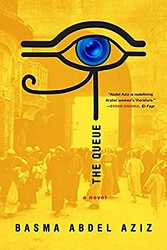
The Queue (Basma Abdel Aziz)
In a surreal, but familiar, vision of modern day Egypt, a centralized authority known as ‘the Gate’ has risen to power in the aftermath of the ‘Disgraceful Events,’ a failed popular uprising. Citizens are required to obtain permission from the Gate in order to take care of even the most basic of their daily affairs, yet the Gate never opens, and the queue in front of it grows longer.
Citizens from all walks of life mix and wait in the sun: a revolutionary journalist, a sheikh, a poor woman concerned for her daughter’s health, and even the brother of a security officer killed in clashes with protestors. Among them is Yehia, a man who was shot during the Events and is waiting for permission from the Gate to remove a bullet that remains lodged in his pelvis. Yehia’s health steadily declines, yet at every turn, officials refuse to assist him, actively denying the very existence of the bullet.
Ultimately it is Tarek, the principled doctor tending to Yehia’s case, who must decide whether to follow protocol as he has always done, or to disobey the law and risk his career to operate on Yehia and save his life.
Written with dark, subtle humor, The Queue describes the sinister nature of authoritarianism, and illuminates the way that absolute authority manipulates information, mobilizes others in service to it, and fails to uphold the rights of even those faithful to it.
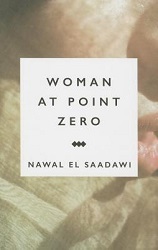
Woman at Point Zero (Nawal El Saadawi)
OP note: Non-fiction lovers can try the author's autobiography, A Daughter of Isis.
"However, every single man I did get to know filled me with but one desire: to lift my hand and bring it smashing down on his face."
So begins Firdaus's story, leading to her grimy Cairo prison cell, where she welcomes her death sentence as a relief from her pain and suffering. Born to a peasant family in the Egyptian countryside, Firdaus suffers a childhood of cruelty and neglect. Her passion for education is ignored by her family, and on leaving school she is forced to marry a much older man. Following her escapes from violent relationships, she meets Sharifa, who leads her into a life of prostitution, telling her that 'a man does not know a woman's value ... the higher you price yourself the more he will realize what you are really worth.' Desperate and alone, she takes drastic action.
Saadawi's searing indictment of society's brutal treatment of women continues to resonate today. This classic novel has been an inspiration to countless people across the world.
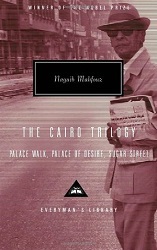
The Cairo Trilogy: Palace Walk / Palace of Desire / Sugar Street (Naguib Mahfouz)
OP note: As a Nobel Prize winning author, Mahfouz's books will probably be the easiest to find in libraries.
Naguib Mahfouz’s magnificent epic trilogy of colonial Egypt appears here in one volume for the first time. The Nobel Prize-winning writer's masterwork is the engrossing story of a Muslim family in Cairo during Britain's occupation of Egypt in the early decades of the twentieth century.
The novels of The Cairo Trilogy trace three generations of the family of tyrannical patriarch Al-Sayyid Ahmad Abd al-Jawad, who rules his household with a strict hand while living a secret life of self-indulgence. Palace Walk introduces us to his gentle, oppressed wife, Amina, his cloistered daughters, Aisha and Khadija, and his three sons-the tragic and idealistic Fahmy, the dissolute hedonist Yasin, and the soul-searching intellectual Kamal. Al-Sayyid Ahmad’s rebellious children struggle to move beyond his domination in Palace of Desire, as the world around them opens to the currents of modernity and political and domestic turmoil brought by the 1920s. Sugar Street brings Mahfouz’s vivid tapestry of an evolving Egypt to a dramatic climax as the aging patriarch sees one grandson become a Communist, one a Muslim fundamentalist, and one the lover of a powerful politician.
Throughout the trilogy, the family's trials mirror those of their turbulent country during the years spanning the two World Wars, as change comes to a society that has resisted it for centuries.
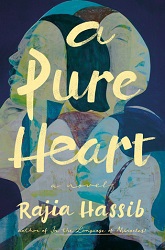
A Pure Heart (Rajia Hassib)
Sisters Rose and Gameela Gubran could not have been more different. Rose, an Egyptologist, married an American journalist and immigrated to New York City, where she works in the Metropolitan Museum of Art. Gameela, a devout Muslim since her teenage years, stayed in Cairo. During the aftermath of Egypt's revolution, Gameela is killed in a suicide bombing. When Rose returns to Egypt after the bombing, she sifts through the artifacts Gameela left behind, desperate to understand how her sister came to die, and who she truly was. Soon, Rose realizes that Gameela has left many questions unanswered. Why had she quit her job just a few months before her death and not told her family? Who was she romantically involved with? And how did the religious Gameela manage to keep so many secrets?
Rich in depth and feeling, A Pure Heart is a brilliant portrait of two Muslim women in the twenty-first century, and the decisions they make in work and love that determine their destinies. As Rose is struggling to reconcile her identities as an Egyptian and as a new American, she investigates Gameela's devotion to her religion and her country. The more Rose uncovers about her sister's life, the more she must reconcile their two fates, their inextricable bond as sisters, and who should and should not be held responsible for Gameela's death. Rajia Hassib's A Pure Heart is a stirring and deeply textured novel that asks what it means to forgive, and considers how faith, family, and love can unite and divide us.
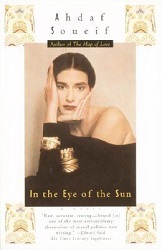
In the Eye of the Sun (Ahdaf Soueif)
OP note: This book is LONG so only pick it up if you have a lot of free time to complete the challenge! The same author also wrote The Map of Love, which was shortlisted for the Booker and is probably not difficult to find in libraries.
Set amidst the turmoil of contemporary Middle Eastern politics, this vivid and highly-acclaimed novel by an Egyptian journalist is an intimate look into the lives of Arab women today. Here, a woman who grows up among the Egyptian elite, marries a Westernized husband, and, while pursuing graduate study, becomes embroiled in a love affair with an uncouth Englishman.

The Open Door (Latifa Zayyat)
February 1946: Cairo is engulfed by demonstrations against the British. Layla's older brother Mahmud returns, wounded in the clashes, and the events of that fateful day mark a turning point in her life, an awakening to the world around her.
Latifa al-Zayyat's acclaimed modern classic follows Layla through her sexual and political coming of age. Her rebellious spirit seeks to free itself from the stifling social codes that dictate a young woman's life, just as Egypt struggles to shake off the yoke of imperialist rule.
The Open Door is a landmark of women's writing in Arabic. Published in 1960, it was very bold for its time in exploring a middle-class Egyptian girl's coming of sexual and political age, in the context of the Egyptian nationalist movement preceding the 1952 revolution. The novel traces the pressures on young women and young men of that time and class as they seek to free themselves of family control and social expectations. Young Layla and her brother become involved in the student activism of the 1940s and early 1950s and in the popular resistance to continued imperialist rule; the story culminates in the 1956 Suez Crisis, when Gamal Abd al-Nasser's nationalization of the Canal led to a British, French, and Israeli invasion. Not only daring in her themes, Latifa al-Zayyat was also bold in her use of colloquial Arabic, and the novel contains some of the liveliest dialogue in modern Arabic literature.
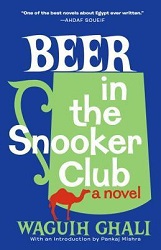
Beer in the Snooker Club (Waguih Ghali)
Set amidst the turbulence of 1950s Cairo, Beer in the Snooker Club is the story of Ram Bey, an over-educated, under-ambitious young Egyptian struggling to find out where he fits in. Ram’s favorite haunt is the fashionable Cairo Snooker Club, whose members strive to emulate English gentility; but his best friends are young intellectuals who devour the works of Sartre and engage in dangerous revolutionary activities to support Egyptian independence. By turns biting and comic, Beer in the Snooker Club - the first and only book by Waguih Ghali - became a cult classic when it was first published and remains a timeless portrait of a loveable rogue coming of age in turbulent times.
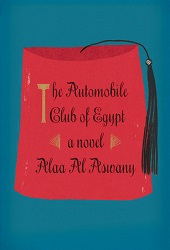
The Automobile Club of Egypt (Alaa Al Aswany)
Once a respected landowner, Abd el-Aziz Gaafar fell into penury and moved his family to Cairo, where he was forced into menial work at the Automobile Club-a refuge of colonial luxury for its European members. There, Alku, the lifelong Nubian retainer of Egypt's corrupt and dissolute king, lords it over the staff, a squabbling but tight-knit group, who live in perpetual fear, as they are thrashed for their mistakes, their wages dependent on Alku's whims. When, one day, Abd el-Aziz stands up for himself, he is beaten. Soon afterward, he dies, as much from shame as from his injuries, leaving his widow and four children further impoverished. The family's loss propels them down different paths: the responsible son, Kamel, takes over his late father’s post in the Club's storeroom, even as his law school friends seduce him into revolutionary politics; Mahmud joins his brother working at the Club but spends his free time sleeping with older women - for a fee, which he splits with his partner in crime, his devil-may-care workout buddy and neighbor, Fawzy; their greedy brother Said breaks away to follow ambitions of his own; and their only sister, Saleha, is torn between her dream of studying mathematics and the security of settling down as a wife and saving her family.
It is at the Club, too, that Kamel's dangerous politics will find the favor and patronage of the king's seditious cousin, an unlikely revolutionary plotter-cum-bon vivant. Soon, both servants and masters will be subsumed by the brewing social upheaval. And the Egyptians of the Automobile Club will face a stark choice: to live safely, but without dignity, or to fight for their rights and risk everything.
NON-FICTION

The Man in the White Sharkskin Suit: My Family's Exodus from Old Cairo to the New World (Lucette Lagnado)
OP note: Winner of the Sami Rohr Prize for Jewish Literature.
In vivid and graceful prose, Lucette Lagnado re-creates the majesty and cosmopolitan glamour of Cairo in the years between World War II and Gamal Abdel Nasser's rise to power. Her father, Leon, was a boulevardier who conducted business on the elegant terrace of Shepheard's Hotel, and later, in the cozy, dark bar of the Nile Hilton, dressed in his signature white sharkskin suit. But with the fall of King Farouk and Nasser's nationalization of Egyptian industry, Leon and his family lose everything. As streets are renamed, neighborhoods of their fellow Jews disbanded, and the city purged of all foreign influence, the Lagnados, too, must make their escape. With all of their belongings packed into twenty-six suitcases, their jewels and gold coins hidden in sealed tins of marmalade, Leon and his family depart for any land that will take them. The poverty and hardships they encounter in their flight from Cairo to Paris to New York are strikingly juxta-posed against the beauty and comforts of the lives they left behind.
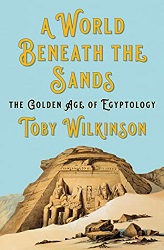
A World Beneath the Sands: the Golden Age of Egyptology (Toby Wilkinson)
From the decipherment of hieroglyphics in 1822 to the discovery of Tutankhamun’s tomb by Howard Carter and Lord Carnarvon a hundred years later, the uncovering of Egypt’s ancient past took place in an atmosphere of grand adventure and international rivalry.
In A World Beneath the Sands, acclaimed Egyptologist Toby Wilkinson chronicles the ruthless race between the British, French, Germans, and Americans to lay claim to its mysteries and treasures. He tells riveting stories of the men and women whose obsession with Egypt’s ancient civilization helped to enrich and transform our understanding of the Nile Valley and its people, and left a lasting impression on Egypt, too. Travelers and treasure-hunters, ethnographers and archaeologists: whatever their motives, whatever their methods, a century of adventure and scholarship revealed a lost world, buried for centuries beneath the sands.
More lists of Egyptian books
Book Riot's 50 must-read books from Egypt
Egyptian Streets' 10 Must-read books by Egyptian writers
Arab Lit has a helpful guide to Egytian authors
Goodreads' Books by Egyptian authors in English
10 Books b Egyptian female authors
sources 1 2 3 4 5 6 7 8 9 10 11